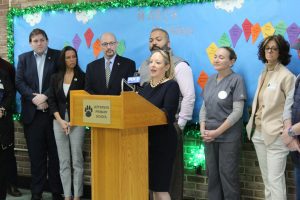Long Island advocates rally for free school meals for all state students

Long Island advocates received support from elected officials and school administrators last week to call on New York State Gov. Kathy Hochul (D) to include a program that will save all families money regarding school meals in the 2024 state budget.

Proponents gathered at Jefferson Primary School in Huntington Friday, March 24, to make their plea to the governor at a press conference. The call comes after federal waivers that provided free breakfast and lunch for all students during the COVID-19 pandemic ended last June.
Speakers asked for the governor to provide fully funded school meals for all students in the 2024 state budget. The move could potentially help nearly a quarter million students on Long Island alone.
The Healthy School Meals for All New York Kids program has received bipartisan support in both the state Senate and Assembly. Senators and Assembly members have allocated $280 million in funding in their budget proposals. Supporters say such a program that would provide free lunch and breakfast to students can have a broader effect, taking pressure off food banks and positively impacting the community as a whole. Speakers at the press conference said that many families whose children are eligible for free meals at school are too embarrassed to apply, while others, who are not eligible due to strict income thresholds to qualify, still experience financial stress.
Rebecca Sanin, president and CEO of the Health and Welfare Council of Long Island, said while universally free meals at school was something families could count on during the pandemic, once the federal program ended, 243,000 children in Suffolk and Nassau counties lost their access to free school meals. She added HWCLI is part of a broader statewide coalition of more than 250 organizations asking the governor to include the Healthy School Meals for All program in the budget.
“We know that throughout history we get these moments in time where our actions can really magnificently transform future generations to come,” Sanin said at the press conference. “Today is one of those moments.”
She added that many on Long Island suffer from hunger, poverty, and economic and family stresses that prevent them from receiving proper nourishment.
“When every child in New York can access meals at school, we will be actively reducing hunger,” Sanin said. “We will be actively reducing underachievement. We will be actively reducing poor health outcomes. We will be actively reducing behavioral challenges.”
Jim Polansky, superintendent of Huntington school district and president of the Suffolk County School Superintendents Association, said the economic crisis that has followed the pandemic has made the “universal free meal programs more important than ever.”
“Many people in our community, throughout the region and across the state are struggling to put food on the table, and it may take years for those struggling to recover financially,” he said. “Food insecurity has unfortunately become commonplace.”
He added some districts in the state are able to continue providing free meals through the Community Eligibility Provision program, yet there are also districts that do not meet the CEP criteria. CEP provides a federal non-pricing meal service option for schools and school districts in low-income areas.
“No child should go hungry, and no child or family should be stigmatized because they qualify for benefits resulting from family income status,” Polansky said. “Furthermore, there is considerable evidence that children who arrive to school hungry can develop significant mental health issues, including depression and anxiety as well as physical health issues, which lead to difficulties in focusing on academics and other school activities.”
The New York State 2024 budget is due April 1.






